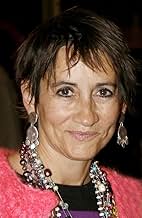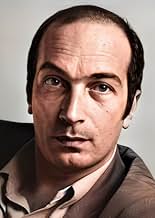IMDb रेटिंग
7.7/10
7.3 हज़ार
आपकी रेटिंग
1968 में पेरिस के बौद्धिक दृश्य में चौविस्टअलेक्जेंड्रे कई महिलाओं के साथ संबंधों को संतुलित करता है, जिनमें माता मेरी और यौन उत्पीड़ित वैरनिका शामिल हैं.1968 में पेरिस के बौद्धिक दृश्य में चौविस्टअलेक्जेंड्रे कई महिलाओं के साथ संबंधों को संतुलित करता है, जिनमें माता मेरी और यौन उत्पीड़ित वैरनिका शामिल हैं.1968 में पेरिस के बौद्धिक दृश्य में चौविस्टअलेक्जेंड्रे कई महिलाओं के साथ संबंधों को संतुलित करता है, जिनमें माता मेरी और यौन उत्पीड़ित वैरनिका शामिल हैं.
- पुरस्कार
- 3 जीत और कुल 1 नामांकन
Jean-Claude Biette
- Un homme aux Deux Magots
- (बिना क्रेडिट के)
Jean Douchet
- Un homme au Café de Flore
- (बिना क्रेडिट के)
Bernard Eisenschitz
- Maurice
- (बिना क्रेडिट के)
Jean Eustache
- Le mari de Gilberte
- (बिना क्रेडिट के)
- …
Caroline Loeb
- Une jeune fille qui lit le journal en terrasse
- (बिना क्रेडिट के)
Noël Simsolo
- Un homme au Café de Flore
- (बिना क्रेडिट के)
फ़ीचर्ड समीक्षाएं
The movie carries off the daunting challenge set by its extreme length: the first half or so is essentially a comedy of manners, with Leaud's rampant intellectualism constantly tipping over into borderline absurdity (underlined by the deadpan sketches of his friends and their wantonly do-nothing, posturing world; his manipulation of women almost masterful. But the spectrum shifts to show the psychological complexity beneath the 'whore' - in her long final monologue asserting her humanity and then traveling beyond that to assert the aridness of a relationship that doesn¹t generate children: it's as if the posturing were being ripped apart, as if everything was being reanalyzed from the most basic biology. And that reanalysis elevates the women - they both have careers whereas we¹re never sure how he finances himself; their friendship when it comes seems intuitive to an extent that he lacks, so that he's reduced to moping and grasping at opportunities. The final hour or so is an amazing topography of emotional upheaval, discovery and raw pain. An almost brilliant film that expresses the lie of the facile attitudinizing of the times and has an awesome grasp of psychological ambiguity and rawness.
One of the last classics of the French New Wave. For direction, cineaste Jean Eustache drew from the simplicity of early-century cinema; for story, Eustache drew on the torments of his own complicated love life. So many things can be said of this film - observationally brilliant; self indulgently overlong; occasionally hilarious; emotionally draining...etc. etc. In my mind, whatever complaints that can be leveled against this film are easily overshadowed by its numerous strengths. Every film student, writer, or simply anyone willing to handle a 3 hour film with no abrupt cuts, no music video overstyling, no soap opera-like plot twists, and no banal dialogue should make it a point to see this movie. Everything is to be admired: the writing (concise, clever, surprisingly funny), acting (everyone, quite simply, is perfect in their respective roles), and, simple direction (the viewer feels like a casual observer within the film) make this film unforgettable. This is undoubtedly a film that stays with you.
10catdoduc
La Maman et la Putain has to be watched as a movie that is both related to the time it was released (post-68) and eternal in many respects. True, the actors don't "act" ... True, they talk a lot... But what they talk about is just what makes life worth living... or dying. The very long monologue spoken by Françoise Lebrun is perhaps the most accurate and moving text that was ever written about womanhood, manhood and love. Not easy to translate accurately, though. This movie is a statement about the difficulty of being a man and a woman (or two women in this case). And IMHO, Jean Pierre Léaud is one of the greatest French actors.
In Paris, the pedantic Alexandre (Jean-Pierre Léaud) lives with his mate Marie (Bernadette Lafont) in her apartment, an open relationship. Alexandre, who is idle and chauvinist, spends his days reading, drinking and shagging women. After flirting with his former affair, Gilberte (Isabelle Weingarten), who tells him that she will marry soon her boyfriend, Alexandre meets the Laenne Hospital nurse Veronika Osterwald (Françoise Lebrun) and they schedule a date. Alexandre learns that Veronika is a promiscuous woman that loves to shag and introduces her to Marie. They have a threesome and Alexandre has a crush on Veronika.
"La Maman et la Putain" is an overrated and dull French New Wave cult-movie by Jean Eustache about the sexual adventures of a pedantic chauvinist. I do not have the intention to offend the umpteen fans of this director and film, but I really did not like this long film of three and half hours. There are witty dialogs and situations, but in general I found it very dull with empty characters.
The expensive DVD released in Brazil by Lume Distributor is a shameful recording of French television broadcasting with an announcement in the credits. My vote is five.
Title (Brazil): "A Mãe e a Puta" ("The Mother and the Whore")
"La Maman et la Putain" is an overrated and dull French New Wave cult-movie by Jean Eustache about the sexual adventures of a pedantic chauvinist. I do not have the intention to offend the umpteen fans of this director and film, but I really did not like this long film of three and half hours. There are witty dialogs and situations, but in general I found it very dull with empty characters.
The expensive DVD released in Brazil by Lume Distributor is a shameful recording of French television broadcasting with an announcement in the credits. My vote is five.
Title (Brazil): "A Mãe e a Puta" ("The Mother and the Whore")
10yarns
It is not an easy film to watch - it is over three and a half hours long and it is composed entirely of conversations. Yet it is so incredibly compelling and ruthlessly observational of the human character, that it is, in my humble opinion, one of the very greatest films of all time.
The film is depressing, cynical and cruel. (If you want something uplifting, see Jacques Rivette's fantastic Céline and Julie Go Boating, which was made around the same time). It shows the idealism of the late 1960s to be nothing different from the society that it was trying to change.
It involves a supposedly liberated ménage-à-trois between Alexandre (played by Jean-Pierre Leaud), Marie (Bernadette Lafont) and Veronika (Francoise Lebrun). Yet Alexandre is shown to be as chauvinistic and jealous as any other man. The women are exposed as being willingly subservient and defining their femininity through the male gaze.
The film is an extremely icy end to the highly revolutionary French New Wave. This movement was one of the most significant movements in film history and had a profound effect on cinema as we know it. Jean-Pierre Leaud was one of the key actors of the New Wave, having starred (among other films) in the influential Les Quatres Cent Coups (1959) by Francois Truffaut as a rebellious teenager. Director Jean Eustache is not as well known as other directors from the New Wave, but he should be.
There is no improvisation (unlike in John Cassavetes's similar films made in the US) and the dialogue comes from real-life conversations. The film is resonant with Eustache's personal experiences. For example, Francoise Lebrun was a former lover of Eustache. Eustache himself committed suicide in 1981 and the real-life person that the character Marie was based on, did too. The anger and bitterness all culminate in a harrowing monologue by Veronika delivered directly to the audience, breaking down the coldly objective nature of the rest of the film. This mesmerising, personal, and honest filmic statement remains one of the most revealing films of human nature around.
The film is depressing, cynical and cruel. (If you want something uplifting, see Jacques Rivette's fantastic Céline and Julie Go Boating, which was made around the same time). It shows the idealism of the late 1960s to be nothing different from the society that it was trying to change.
It involves a supposedly liberated ménage-à-trois between Alexandre (played by Jean-Pierre Leaud), Marie (Bernadette Lafont) and Veronika (Francoise Lebrun). Yet Alexandre is shown to be as chauvinistic and jealous as any other man. The women are exposed as being willingly subservient and defining their femininity through the male gaze.
The film is an extremely icy end to the highly revolutionary French New Wave. This movement was one of the most significant movements in film history and had a profound effect on cinema as we know it. Jean-Pierre Leaud was one of the key actors of the New Wave, having starred (among other films) in the influential Les Quatres Cent Coups (1959) by Francois Truffaut as a rebellious teenager. Director Jean Eustache is not as well known as other directors from the New Wave, but he should be.
There is no improvisation (unlike in John Cassavetes's similar films made in the US) and the dialogue comes from real-life conversations. The film is resonant with Eustache's personal experiences. For example, Francoise Lebrun was a former lover of Eustache. Eustache himself committed suicide in 1981 and the real-life person that the character Marie was based on, did too. The anger and bitterness all culminate in a harrowing monologue by Veronika delivered directly to the audience, breaking down the coldly objective nature of the rest of the film. This mesmerising, personal, and honest filmic statement remains one of the most revealing films of human nature around.
क्या आपको पता है
- ट्रिवियाThis film is based on the real-life relationship between director Jean Eustache and actress Francoise Lebrun (who plays Veronika). The character based on her is named Gilberte in the movie and is played by Isabelle Weingarten.
- गूफ़Alexandre can be seen drinking a bottle of 1970 Gevrey-Chambertin, which would have been far too expensive for him to have purchased. This error is illuminated by his notable lack of money during the cafe scene, in which his date pays for his bill.
- कनेक्शनFeatured in The Story of Film: An Odyssey: European New Wave (2011)
- साउंडट्रैकIch weiß, es wird einmal ein Wunder gescheh'n
Written by Bruno Balz, Michael Jary and Ralph Benatzky
Performed by Zarah Leander
टॉप पसंद
रेटिंग देने के लिए साइन-इन करें और वैयक्तिकृत सुझावों के लिए वॉचलिस्ट करें
- How long is The Mother and the Whore?Alexa द्वारा संचालित
विवरण
- रिलीज़ की तारीख़
- कंट्री ऑफ़ ओरिजिन
- आधिकारिक साइटें
- भाषा
- इस रूप में भी जाना जाता है
- Die Mama und die Hure
- फ़िल्माने की जगहें
- Café Les Deux Magots - 6 place Saint-Germain-des-Prés, Paris 6, पेरिस, फ़्रांस(Alexandre's usual café)
- उत्पादन कंपनियां
- IMDbPro पर और कंपनी क्रेडिट देखें
बॉक्स ऑफ़िस
- US और कनाडा में सकल
- $40,555
- US और कनाडा में पहले सप्ताह में कुल कमाई
- $5,135
- 25 जून 2023
- दुनिया भर में सकल
- $47,344
- चलने की अवधि3 घंटे 37 मिनट
- रंग
- ध्वनि मिश्रण
- पक्ष अनुपात
- 1.37 : 1
इस पेज में योगदान दें
किसी बदलाव का सुझाव दें या अनुपलब्ध कॉन्टेंट जोड़ें






































